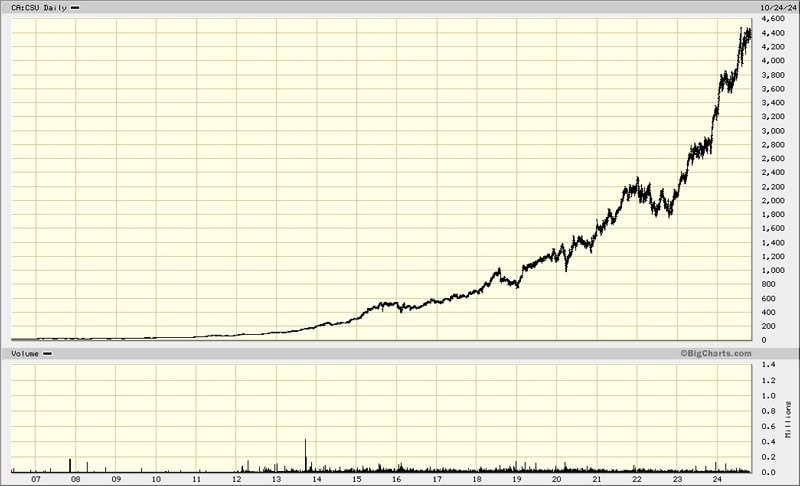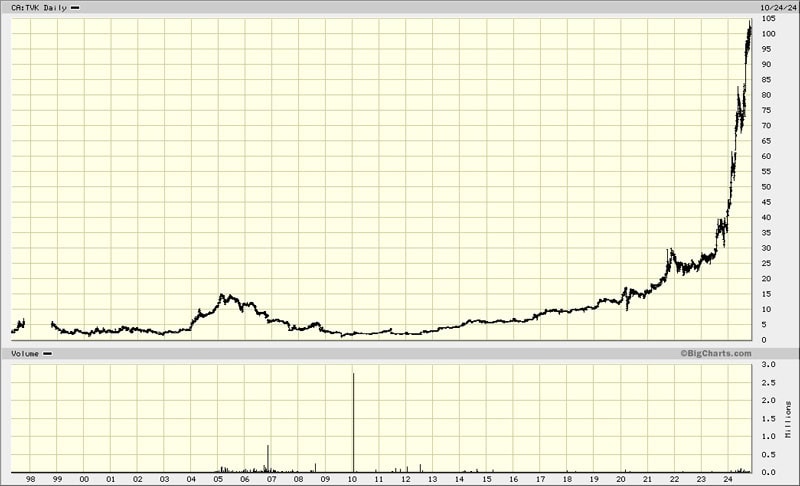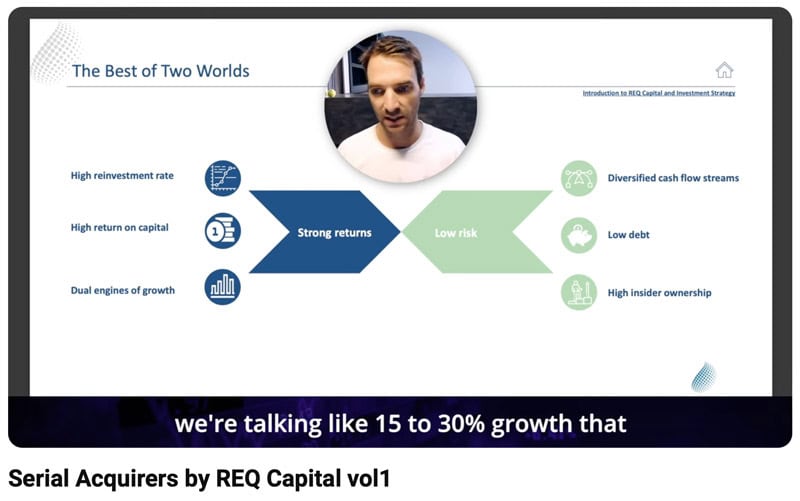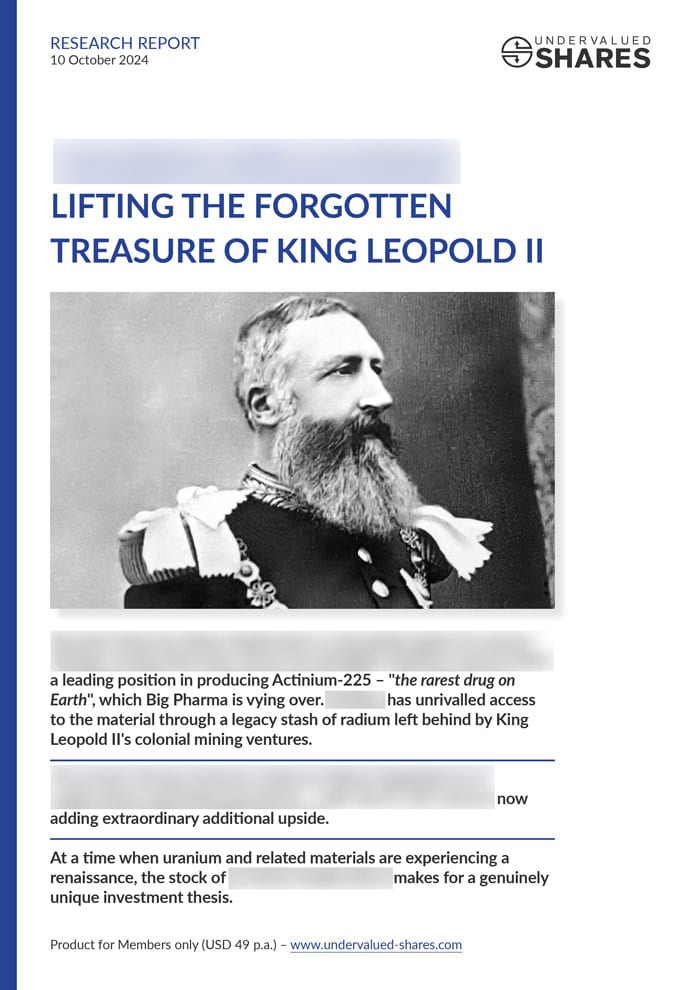Compounding is known as the world's eighth wonder.
So-called roll-ups are often among companies that compound their shareholders' money successfully. In fact, some of the world's greatest investment success stories hail from roll-ups.
Today's Weekly Dispatch offers a short primer, links to reading material, and a shortcut to easily find interesting public candidates from this realm.

Constellation Software, a famous Canadian roll-up.
"Roll-what?"
Roll-ups consolidate the players of an industry into one bigger player. The idea is that the resulting company will achieve greater efficiency through economies of scale, synergies, or the implementation of better management.
For a company to deserve being called a roll-up, there has to be sufficient acquisition activity. Buying one or the other competitor doesn't count. To qualify as a roll-up, a company should get > 50% of its EBITDA growth inorganically through acquisitions in a similar vertical (= industry). The acquired companies individually should be < 50% of consolidated EBITDA.
The concept is similar to that of serial acquirers, i.e. financial outsiders that try to exploit a valuation difference between acquisition targets and the stock market. While serial acquirers are closer to valuation arbitrage, the difference between rollups and serial acquirers is not always clear-cut.
Insights from a practician
What makes a good roll-up?
At the inaugural Weird Shit Investing conference in June 2024, one speaker set out to give an answer. Armed with ample public market experience, that participant now runs a sector-focused roll-up.
As he put it, the following comprise good criteria:
- Market fragmentation
- Decision rule: >500 distinct targets with USD 0.5-5m EBITDA.
- Low purchase multiples
- Decision rule: sub-5x on unlevered FCF (pre-synergies).
- Predictable earnings
- Decision rule: revenue volatility, >30% EBITDA margin.
- Asset-light
- Decision rule: MCX as % sales, >70% FCF conversion.
- Pricing power
- Decision rule: has to be judged based on experience.
Mentioning synergies in this context is inevitable, as they are often quoted the #1 reason for the success of roll-ups. Does the claim hold true, though?
"Synergies are overrated", the conference speaker stated, but noting that it's a controversial view that he regularly gets heat for. In his view, most of the returns come from using debt to fund parts of the acquisitions and reinvesting cash flow. Famous examples of successful roll-ups without major synergies at play include Constellation Software (ISIN CA21037X1006, CA:CSU), Watsco (ISIN US9426222009, NYSE:WSO), and Alimentation Couche-Tard (ISIN CA01626P1484, CA:ATD). Indeed, investors should be very critical whenever CEOs of roll-ups speak of synergies, as they could simply use them to justify acquisitions.
Some cases of synergies do work, of course – such as route density, which also creates network effects. Route density may come to play a role when consolidating businesses in waste or equipment rentals. Logistics and transport is another industry where that is the case, e.g. freight forwarders like Expeditors International of Washington (ISIN US3021301094, NYSE:EXPD) and Kuehne + Nagel International (ISIN CH0025238863, CH:KNIN).
Naturally, much is down to judging the individual circumstances. However, a couple of widely underrated factors to look out for include:
- Pricing power, e.g. because customers of the rolled-up business are facing high switching costs. Roll-ups that have successfully demonstrated the effects of pricing power include TransDigm Group (ISIN US8936411003, NYSE:TDG), Bausch Health / formerly Valeant (ISIN CA0717341071, CA:BHC), and Service Corporation International (ISIN US8175651046, NYSE:SCI).
- Labour headaches, especially when trying to roll up local service businesses like FedEx routes, plumbers, and electricians. Very high turnover of blue collar labour is one of the reasons why these cases often don't work. As a simple test to check a roll-up company, see what their labour cost is as a percentage of revenue, revenue per employee, and employee turnover. Nota bene, the headache caused by blue labour is not stopping hordes of graduates from Harvard Business School to start funds for this space – it's become a running joke even.
- Patience, and the ability to view a roll-up as a marathon, not a sprint. When you have a levered balance sheet, moving fast and breaking things will – indeed – break things if or when you find yourself in a rising rate environment. A good roll-up will carefully build relationships with the owners of potential acquisition targets, not abuse pricing power for short-term gain, and exert caution with its capital structure.
So, what really matters?
The combo that investors need to look for consists of:
- Buy good assets
- At low multiples
- With debt
- Patiently
- Repeat.
Find a good market... then execute!
What's the best way to find publicly listed roll-ups that you can invest in?
Outside of manually researching the many such companies listed on stock markets around the world, there is one useful shortcut.
Learning from the experts (and nicking ideas)
Out of 50,000 investment funds globally, some have a particular focus on roll-ups and/or serial acquirers.
And some are even sharing their intel with the public – such as London-based P&R Investment Management, which in December 2023 published "A special on serial acquirers".
As the 23-page deck puts it: "Serial acquirers have two growth engines, resulting in more stability and reliable earnings growth. Serial acquirers can grow earnings from making the existing operations more profitable and they can add earnings from acquisitions."
These companies have massively outperformed the broader market.
As touched on above, the nomenclature of this particular approach to investing is not entirely clear-cut. E.g., while P&R Investment Management talks of "serial acquirers", two of the companies that the fund highlights in its most recent investor letter are widely referred to as "roll-ups" on other websites: Kelly Partners Group (ISIN AU000000KPG7, AU:KPG), an Australian accountancy roll-up, and TerraVest Industries (ISIN CA88105G1037, CA:TVK), a company acquiring operators in the exceedingly boring propane gas storage and transportation industry.

TerraVest Industries.
P&R Investment Management has performed strongly thanks to its focus on serial acquirers. The fund's publications are likely to remain a valuable inspiration for anyone looking for ideas in that space.
And for those who want to delve yet deeper into the subject matter, there is the epic 326-page deck "A Deep Dive into Shareholder Value Creation by Acquisition-Driven Compounders". Published by REQ Capital, an independent investment firm based out of Oslo and Stockholm, it analyses what it calls "acquisition-driven compounders" or "programmatic acquirers" – companies that have the acquisition of smaller private firms at the heart of their strategy.
REQ Capital breaks these companies down into two categories:
- "Specialists", which focus on a single vertical (industry) and are more akin to conventional roll-ups.
- "Generalists", which acquire companies across multiple verticals and more resemble serial acquirers.
The deck has an unbelievable level of depth and data, and some regard it as the bible for the sector. It has even been turned into a series of short explainer videos by one investment YouTuber.

Source: Andrew Brown, YouTube channel.
You can also download the free 60-page "Serial Acquirer Book" by acquirers.com, a niche publisher and community dedicated to the space. There is also the "Deep dive into the add-on roll-up strategy of serial acquirers" by FLEX Capital, and the very technical "Background Note - Serial Acquisitions and Industry Roll-ups" published by the OECD.
Scratching the surface
"I am still trying to figure this out. Take it all with a grain of salt!", the conference speaker said, despite having worked in this space for years.
Roll-ups are a complex subject!
Practice makes the master, but it inevitably takes years.
For anyone looking for a first orientation on the subject, hopefully this Weekly Dispatch will have provided some initial direction.
A hidden investment gem that nukes cancer – literally!
A new "mainstream therapy" for tackling 50 (!) different forms of cancers?
The global hunt is on for Actinium-225, the uber-rare nuclear isotope that has turned out a potent weapon against cancer.
The trouble is, hardly anyone has got any of it.
Hardly anyone – except a little-known Belgian company which has suddenly emerged as the potential global market leader for supplying the material.
A hidden investment gem that nukes cancer – literally!
A new "mainstream therapy" for tackling 50 (!) different forms of cancers?
The global hunt is on for Actinium-225, the uber-rare nuclear isotope that has turned out a potent weapon against cancer.
The trouble is, hardly anyone has got any of it.
Hardly anyone – except a little-known Belgian company which has suddenly emerged as the potential global market leader for supplying the material.
Did you find this article useful and enjoyable? If you want to read my next articles right when they come out, please sign up to my email list.
Share this post:









